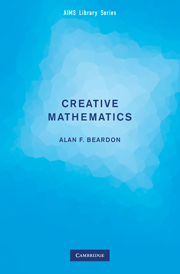2 - Writing Mathematics
Published online by Cambridge University Press: 16 May 2024
Summary
There are many circumstances in which we may be asked to write some mathematics or, more generally, a scientific report. It is not easy to write a good report, and it takes a lot of time to learn, but it is a skill that most people can learn. You may find that writing a report is more difficult than giving a lecture. When we give a lecture we can assess how the audience is reacting, and we can say more, or less, in response to this. We cannot do this when writing a report. Here we offer some general suggestions and hints on how to write a good report. We do not specify the nature of the report, and, for obvious reasons, we direct much of our attention towards the writing of mathematics (which we continue to refer to as a ‘report’). This is not a set of golden rules to follow; rather, it is a list of points to think about, and consider, before, and during, the writing of the report. It should help us decide what to include and what to omit.
Before we consider the typical structure of a report, you should consider the following important questions.
• Why are you writing a report?
• Who will read the report, and what are they looking for?
In order to write a good report we must be clear about the purpose of our report: what do we want to achieve, and what is our message? Keep the purpose of the report in mind at all times; we should have an identifiable reason for including each item in the report.
We should think carefully about the level of knowledge of our intended readers, and what they want to achieve by reading the report, and write accordingly. It is very easy to forget who we are writing for, and at each stage of the writing we should ask what will the reader think of this? Also, be consistent; for example, do not solve quadratic equations while discussing an advanced topic in topology! At any given level some things are obvious and do not need to be said, while other things may need considerable explanation; in each case consider which of these is applicable.
- Type
- Chapter
- Information
- Creative MathematicsA Gateway to Research, pp. 7 - 12Publisher: Cambridge University PressPrint publication year: 2009



